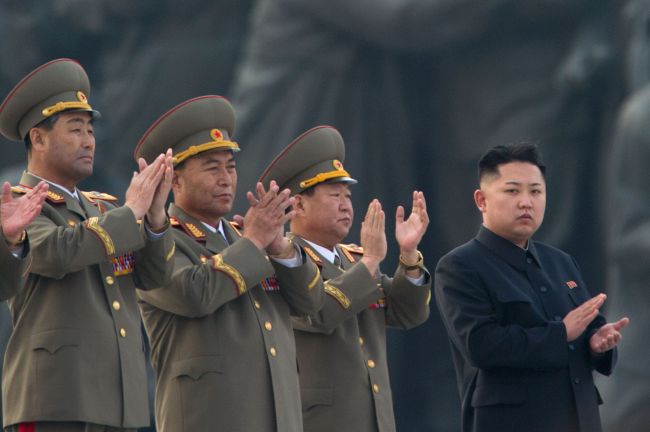North Korea on Thursday demanded South Korea and the U.S. end and apologize for “provocations” such as military drills and international sanctions before they engage in talks proposed by the allies last week.
Seoul and Washington “must stop all provocative acts immediately and completely apologize if they truly want dialogue and negotiations,” the National Defense Commission said in a statement carried by the official Korean Central News Agency.
“At first they will have to withdraw U.N. Security Council sanctions that were cooked up on an absurd pretext.”
The heavily militarized country’s top defense panel reiterated that dialogue and acts of war could never be compatible, insisting the two countries should guarantee that they would not “cling to nuclear war exercises” and withdraw all related weapons.
 |
North Korean leader Kim Jong-un (right) claps during the unveiling ceremony of two statues of former leaders Kim Il-sung and Kim Jong-il in Pyongyang. (AFP) |
The North’s Committee for the Peaceful Reunification of Korea also repeated its earlier demand for the South to stop “behavior impairing our dignity,” war games and other anti-North Korea activity.
The organization in charge of South Korean affairs again laid the blame on the Seoul government for its recent suspension of a joint industrial park in the border city of Gaeseong.
“It is no more than overtalk that (South Korea) spoke of things like ‘dialogue for operation normalization’ while attempting to turn the Gaeseong industrial zone into a treacherous origin of war,” it said through the KCNA.
The CPRK was referring to President Park Geun-hye and Unification Minister Ryoo Kihl-jae’s offer for talks last week to reactivate the factory complex.
During his latest trip to Seoul, U.S. Secretary of State John Kerry said his preferences would be to “get to talks” with Pyongyang through either bilateral or multilateral channels.
The overture came on the heels of weeks-long North Korean threats of a nuclear war with South Korea and the U.S. since they began military drills and the U.N. levied its strongest sanctions last month over a nuclear test.
The preconditions are expected to deepen a war of nerves between the allies and Kim Jong-un’s headstrong regime at least until the annual Foal Eagle exercise running through the end of April.
A senior Unification Ministry official dismissed the demand as “irresponsible” and “hackneyed” rhetoric.
“The response turns away the meaning and intent of the offer from us and the U.S.,” he told reporters on condition of anonymity, adding that no country wanted to invade North Korea.
“It is time for the North to stop making preposterous allegations and demands.”
With the security crisis apparently abating, neighbors are stepping up diplomacy to defuse tension and turn the mood toward dialogue.
Wu Dawei, China’s special representative for Korean peninsula affairs and chief nuclear negotiator, reportedly plans to visit Washington next week and meet key officials including Glyn Davies, U.S. special representative for North Korea policy.
Chinese President Xi Jinping agreed with Kerry last week to soon hold a high-level meeting between the two countries.
At the Capitol Hill on Wednesday, the secretary said that North Korea would collapse without support from its only major ally and economic patron, stressing the significance of cooperation with Beijing.
“China is a significant banking conduit for the North,” Kerry told the House Foreign Affairs Committee, citing Beijing’s providing of large food aid and almost three-quarters of the fuel to Pyongyang.
“I think it’s fair to say that without China, North Korea would collapse. Therefore I think it is important for us to work with China. And I think China has indicated its willingness to work with us.”
By Shin Hyon-hee (
heeshin@heraldcorp.com)








